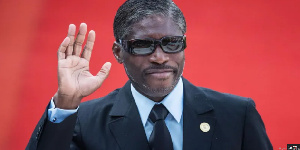- Home - News
- Polls
- Year In Review
- News Archive
- Crime & Punishment
- Politics
- Regional
- Editorial
- Health
- Ghanaians Abroad
- Tabloid
- Africa
- Religion
- Election 2020
- Coronavirus
- Photo Archives
- News Headlines
- Press Release
General News of Thursday, 1 July 2021
Source: starrfm.com.gh
Stop using military for internal Security – CHRI to gov’t
The Commonwealth Human Rights Initiative (CHRI) Africa has called on the government to cease immersing the military in internal security operations which could be handled by the Police.
CHRI believes the deployment of the military for internal security operations is unnecessary and exacerbates infractions and violations against the fundamental human rights of the citizens.
A statement issued Wednesday, June 30 by the CHRI on the killing of two protestors with others sustaining gunshot wounds at Ejura in Ashanti Region urged the government to retrain Police on crowed control.
It also called for the resourcing of the National Commission on Civic Education (NCCE) to stamp out the growing intolerance among the populace.
“The CHRI Africa Office’s attention has been drawn to news reports of the unfortunate death of two (2) persons and severe injuries to others exercising their right to protest at Ejura in the Ashanti Region on June 29, 2021”.
“The Government must cease bringing the military into internal security issues which is the preserve of the police who are supposed to have the training and orientation to deal with such matters.”
It went on “government must resource the National Commission on Civic Education to intensify public education to stop the growing intolerance of divergent opinions in various parts of the country, and Officers of the Ghana Police Service must be re-trained in crowd control techniques in conformity with human rights standards” excerpts of the statement said.”
The youth of Ejura Sekyedumase were protesting the death of a social activist Ibrahim Mohammed alias ‘Kaaka’ who was assaulted and killed by assailants in his home.
The spontaneous protest on the streets occurred shortly after his burial.
Police went to the community to restore law and order but were pelted with stones by the angry youth hence retreated. Military re-enforcement arrived and indiscriminately started shooting at the protesters resulting in the shooting of Abdul Nasir Yusuf and Mutala Mohammed, and injuries of others.
According to the CHRI Africa office,” as much as we find the actions of the youth unacceptable, CHRI totally condemns the deadly force used by the soldiers with the tacit support of the police who abdicated their primary role of keeping the peace and following standard procedures for crowd control.”
“We find these events unsettling because the right to assembly, the right to protest, and freedom of expression are rights guaranteed under Chapter Five of Ghana’s 1992 Constitution. Article 21(1) (d) of Ghana’s 1992 Constitution states: ‘all persons shall have the right to freedom of assembly, including the freedom to take part in processions and demonstrations. Private citizens who are exercising their constitutionally-guaranteed rights should not be met with Military firing live bullets, ending in deaths and injuries.”
CHRI notes a statement issued by the Ashanti Regional Police Command promising to investigate the incident. Additionally, the President, His Excellency Nana Akufo-Addo has instructed the Minister for Interior to investigate the unfortunate disturbances.
While appreciating the efforts to conduct investigations into the matter, it however concerns at the back of precedence where after such investigations, the public does not see any meaningful outcome of such investigations.
Commonwealth Human Rights Initiative (CHRI) Africa office is therefore demanding that “government should make the report of the investigations into the Ejura killings public to engender confidence in the work of the Police Security Officers found culpable must be sanctioned.”
The statement reminded the government of Ghana that as a democratic country that has signed unto international human rights protocols and standards such as the Universal Declaration on Human Rights (UDHR), the International Covenant on Civil and Political Rights (ICCPR), the African Charter on Human and Peoples Rights (ACHPR) and so on, the state has a duty to uphold and protect the Human Rights of all persons and ensure that the security agencies operate according to law, due process and internationally-held
standards.
Entertainment

Bawumia’s $80 bn market value claim for Spotify, false!
Opinions







